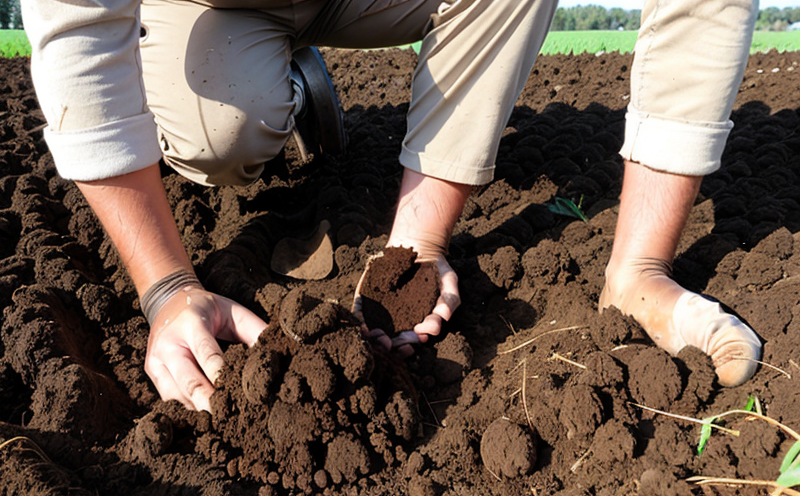Soil Permanent Wilting Point Testing
The soil permanent wilting point (PWP) is a critical parameter that indicates the lowest moisture content at which plant roots can still extract water from the soil. This test is essential in agriculture and forestry to ensure optimal irrigation practices, prevent overwatering, and enhance crop yield by accurately determining the threshold of available water necessary for root health.
Understanding PWP is crucial for optimizing irrigation schedules and managing water resources efficiently. It helps in assessing the water-holding capacity of soil types and predicting drought tolerance levels. This knowledge is particularly vital for sustainable agricultural practices, especially under climate change scenarios where water scarcity is a growing concern.
The permanent wilting point test involves determining the moisture content at which plants begin to die due to insufficient water supply. This threshold varies based on soil texture, organic matter content, and other physical properties of the soil. The test method typically follows international standards such as ISO 12703:2018 or ASTM D6451-99(2013), which provide detailed protocols for accurate measurement.
During the testing process, a representative sample is collected from the field and brought to the laboratory. The soil sample undergoes thorough drying at specific temperatures (usually 105°C) until it reaches a constant weight. This ensures that all bound water has been removed while leaving behind only non-wetting pores filled with air.
The moisture content determined during this process represents the permanent wilting point. It serves as an essential reference for irrigation management, helping farmers and agricultural professionals to set appropriate watering intervals without causing unnecessary stress on plants or wasting precious resources.
By incorporating PWP testing into routine soil analysis programs, organizations can make informed decisions about water use efficiency, improve crop quality, reduce costs associated with overwatering, and contribute positively towards environmental sustainability goals.
Frequently Asked Questions
Benefits
- Optimal irrigation scheduling to prevent overwatering or underwatering
- Enhanced crop yield through improved root health management
- Reduction in water usage and associated costs
- Better understanding of soil properties leading to more sustainable agricultural practices
- Predictive capabilities for assessing drought tolerance levels
- Supports compliance with environmental regulations related to water conservation
- Aids in developing effective strategies for land management and conservation efforts
Why Choose This Test
The soil permanent wilting point test offers several advantages over other types of soil moisture testing. Its primary benefit lies in its ability to provide precise information regarding the lowest moisture content at which plants can survive without succumbing to dehydration stress. This makes it an indispensable tool for agricultural and forestry professionals aiming to achieve optimal water management.
By integrating this test into their routine practices, organizations demonstrate a commitment to responsible resource utilization and environmental stewardship. The results obtained from PWP testing offer valuable insights that contribute significantly towards enhancing crop productivity while minimizing adverse impacts on the environment.
The reliability of these tests is further bolstered by adherence to internationally recognized standards like ISO 12703:2018 or ASTM D6451-99(2013). These guidelines ensure consistency and accuracy across different laboratories, making them trusted sources for accurate soil analysis.
In conclusion, choosing the soil permanent wilting point test not only ensures better decision-making regarding water usage but also plays a pivotal role in promoting sustainable agricultural practices. It empowers stakeholders to make informed choices that balance economic viability with ecological responsibility.
Customer Impact and Satisfaction
The implementation of soil permanent wilting point testing has numerous positive impacts on customers across various sectors including agriculture, forestry, and environmental conservation. For farmers and landowners, this test translates into significant savings in water costs while simultaneously boosting crop yields. By avoiding overwatering episodes, they also reduce the risk of diseases associated with excess moisture.
Forestry practitioners benefit from improved forest health assessments, enabling them to implement targeted interventions aimed at enhancing tree vigor and resilience against pests and pathogens. In addition, this service contributes towards meeting regulatory requirements related to sustainable resource management.
For environmental conservationists, the data derived from PWP testing provides valuable input into ongoing projects focused on ecosystem restoration and biodiversity enhancement. These insights facilitate better planning of reforestation initiatives and contribute positively towards achieving broader sustainability objectives.
In summary, the adoption of soil permanent wilting point testing not only addresses immediate operational needs but also fosters long-term benefits for all stakeholders involved. It underscores the importance of adopting scientific approaches in managing natural resources effectively while ensuring sustainable development remains at the forefront of decision-making processes.





